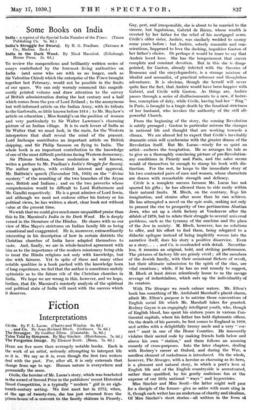Some Books on India India : a reprint of the
.Special India Number of the Times. (Times • Publishing' Co. 7s. 6d.) -
To review the compendious and brilliantly written series of essays contributed by the foremost- living authorities on India • (and some who • are with us no longer, such as Sir Valentine Chirol) which the enterprise of the Times brought together last February, would not be possible in the limits of our space. We can only warmly commend this magnifi- cently printed volume and draw attention to the survey of British administration during the last century and a half which comes from the pen of Lord Zetland ; to the anonymous but well-informed article on the Indian Army, with its tribute to the Garhwalis, so little known before 1914 ; to Mr. Mayhew's article on education ; Miss Sorabji's on the position of women and very particularly to Sir Walter Lawrence's charming picture of an Indian village. It is to such lovers of India as Sir Walter that we must look, in the main, for the Western interpreters that shall reveal the mind of the peasant. Lord Inchcape contributes an important article on British shipping, and Sir Philip Sassoon on flying to India. The whole book is an important contribution to the knowledge of one of the most difficult problems facing Western democracy, Sir Phiroze Sethna, whose moderation is well known. writes a preface to Mr. Pradhan's India's Struggle for Szvaraj. The author quotes, with evident interest and approval, Mr. Baldwin's speech (November 7th, 1929) on the " divine mystery " of the reuniting of the two branches of the Aryan race, British and Indians ; and on the two proverbs whose comprehension would be difficult to Lord Rothermere and Mr. Gandhi respectively. He is a great admirer of Lord Irwin, and although we need not endorse either his history or his political views, he has • written a short, clear book not without value at the present time. • • We wish that we could give muchmore unqualified praise than
this to Dr. Macnicol's India in the Dark Wood. •He is deeply versed in the literature of the Hindus. He shares with us our view of Miss Mayo's strictures on Indian family life as being
sensational and exaggerated. He is, moreover, extraordinarily interesting in his description of how in certain districts the Christian churches of India have adapted themselves to caste. And, finally, we are in whole-hearted agreement with him as to the importance of the modern missionary being able to treat the Hindu religions not only with knowledge, but
also with fairness. Yet in spite of these and many other notable qualities in a book packed with the knowledge born of long experience, we feel that the author is sometimes unduly optimistic as to the future role of the Christian churches in India. We hope we are wrong in this, however, and we hope, further, that Dr. Macnicol's masterly analysis of the spiritual and political state of India will meet with the success which it deserves.














































 Previous page
Previous page